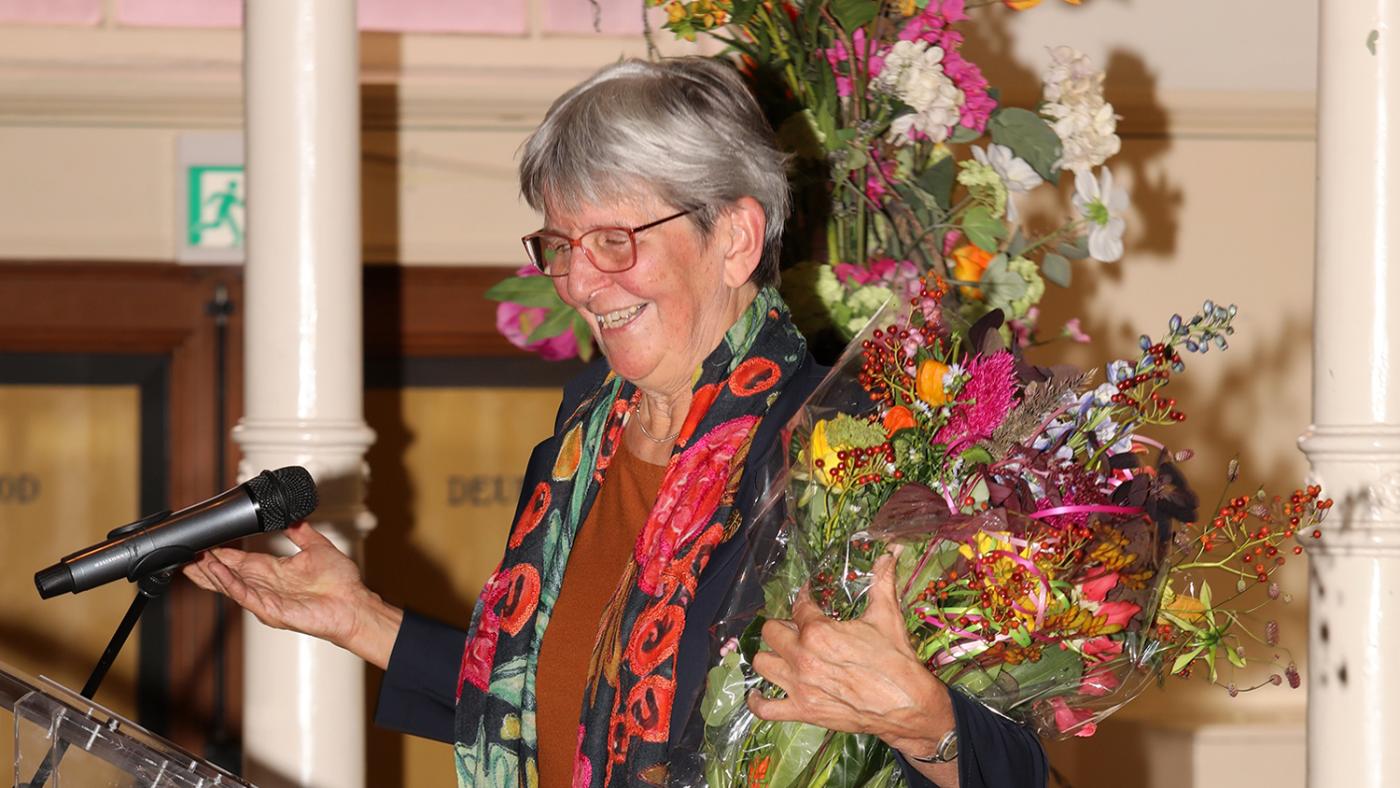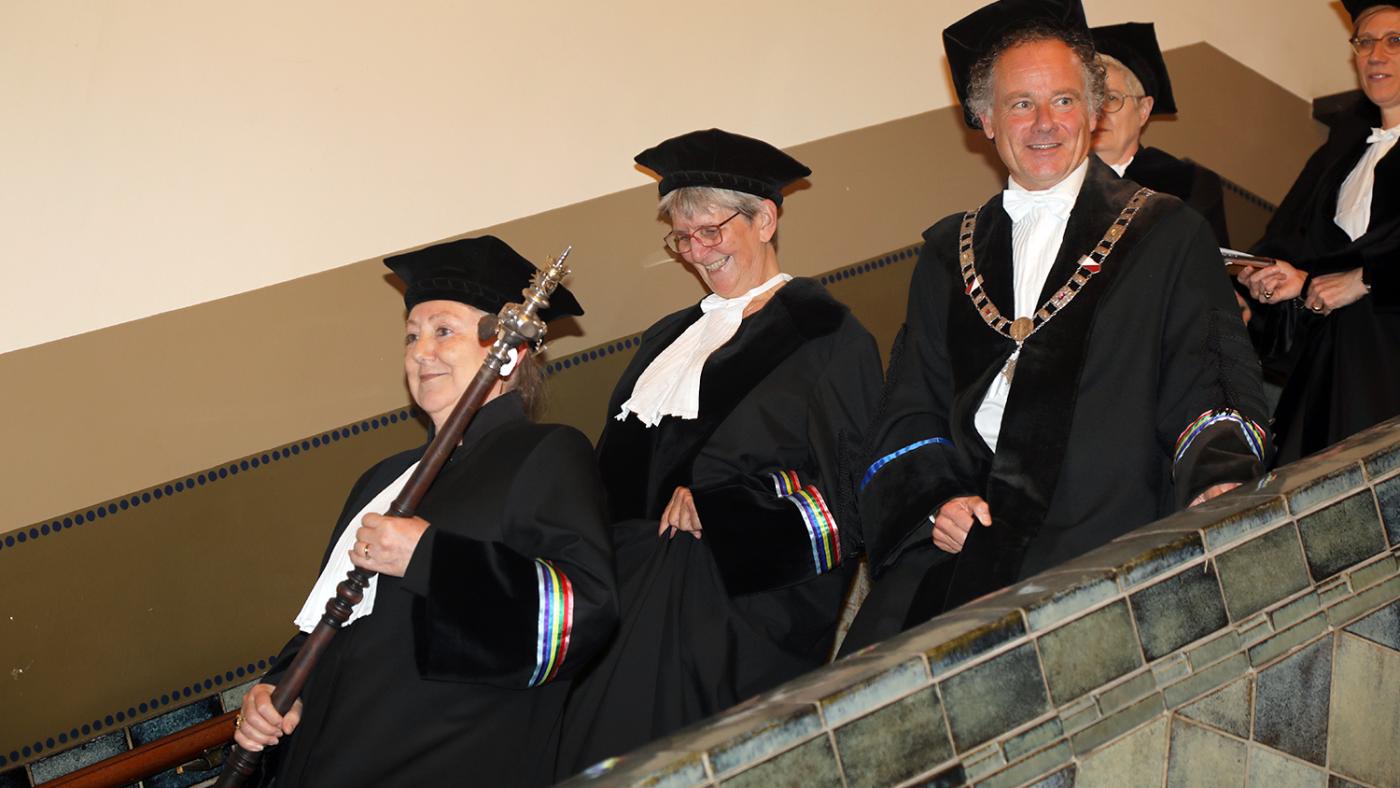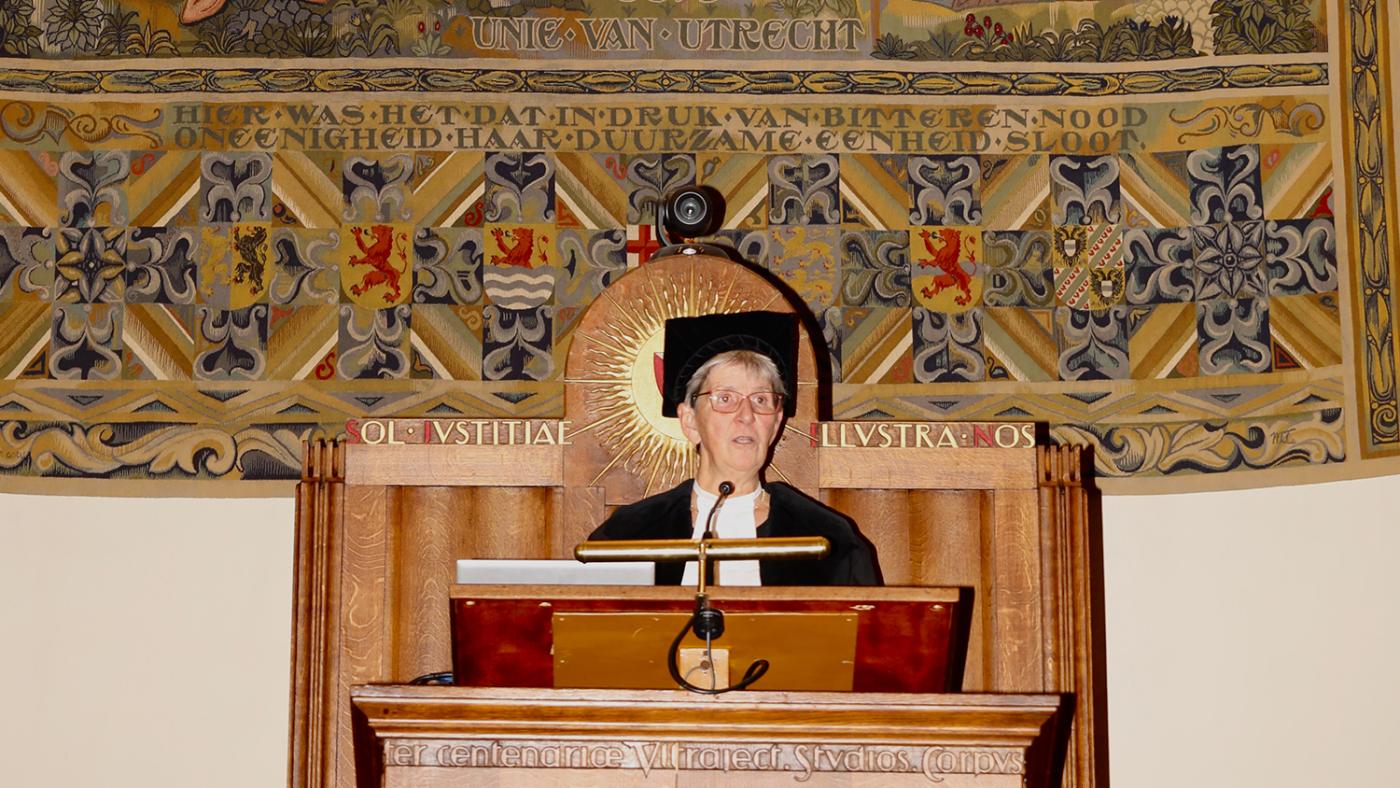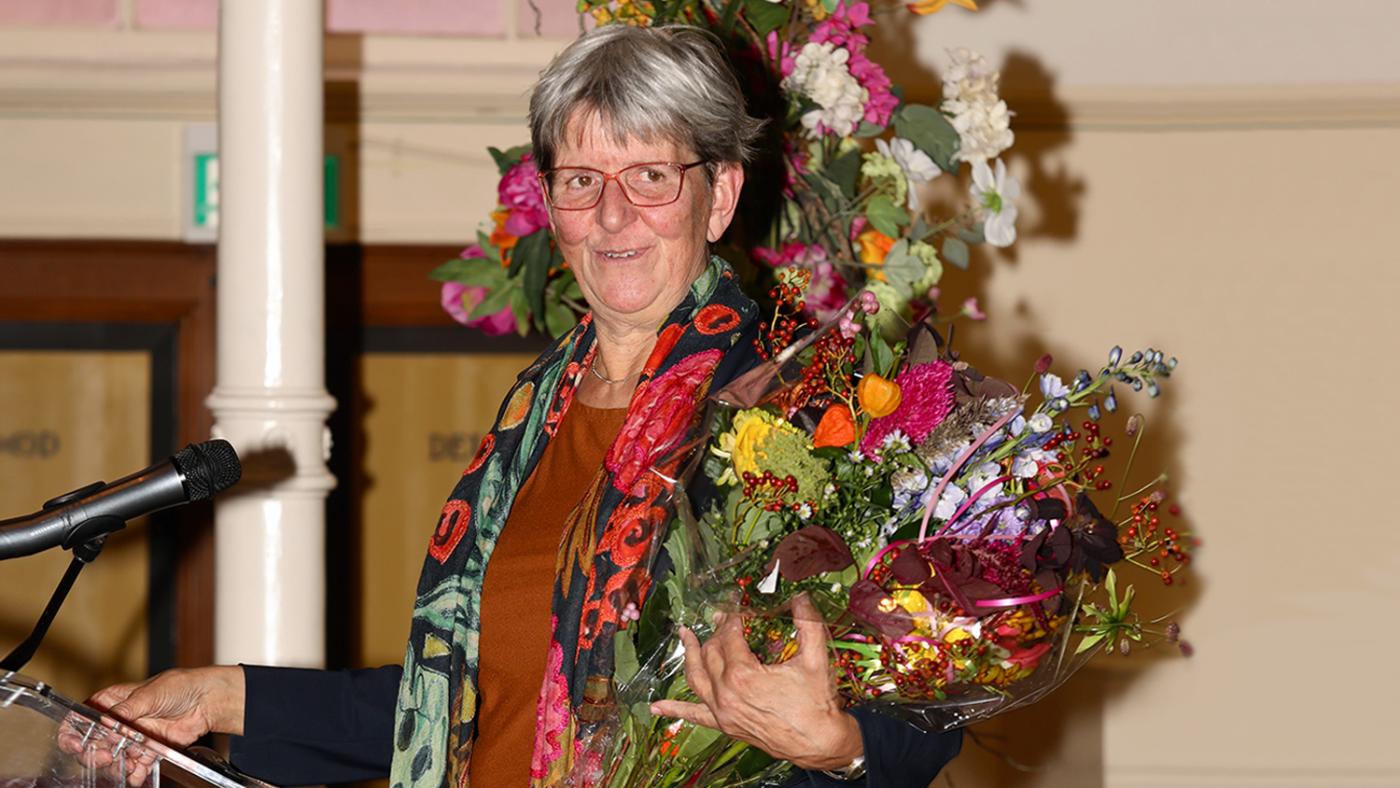Berteke Waaldijk, the ‘face’ of Language & Culture Studies, retires
‘I feel a bit mellow about leaving’

"Students come to a university to learn, but they end up unlearning many things in the process. They lose the spontaneity to ask whatever comes to mind. Berteke Waaldijk encouraged them to keep it", said Professor Iris van der Tuin in Waaldijk’s farewell ceremony on September 30. “Freshers are not ashamed to ask why they are not allowed to say certain things or why no authors of colour are on the compulsory reading list. Berteke Waaldijk stimulated them to keep asking those critical questions.”
No wonder. Waaldijk herself never stopped asking critical questions. Some of her colleagues climbed on a chair in the senate hall to address her. What kept coming back was: “You were always critical and kept asking questions in a friendly way, with an eye for the vulnerable. But sometimes we also thought: ‘There she goes again…’”
Waaldijk gave her farewell lecture to a full house and a whole day of activities was organised by students, colleagues and alumni to celebrate the academic, cherished for her horizontal management style and holistic approach to education and research.
Historian and philosopher Waaldijk joined Utrecht University in 1997 as an Associate Professor in Gender Studies before becoming the coordinator of the Language & Culture Studies Bachelor’s (also known by its Dutch acronym, TCS), the oldest liberal arts programme in the Netherlands.
As a Gender Studies pioneer and TCS coordinator, Waaldijk passionately advocated for interdisciplinarity and transdisciplinarity. The Bachelor’s programme has few courses of its own: students get to attend courses from other programmes within the Faculty of Humanities and elsewhere, combining and forming their own path. Waaldijk was also vocal about the importance of making the university more diverse and inclusive.

How would you describe yourself?
“I’m pretty work-identified. My jobs at UU have been very important and rewarding for me. I have beautiful other parts in my life, but now that I’m retiring, that’s when I’m realising how important my work is to me. It has brought together intellectual, social and political ideals. I have been lucky to land a stunning job.
I feel that I could make a difference in the roles I had at UU. It also allowed me to connect with others, which is crucial for me and everyone. It’s key to be connected to the people around you, those making your work possible. We would not be able to do innovative research if there were no cleaners, facility management, people organising the schedules, the legal team, ICT and website managers, and DUB journalists reporting the news. So many people make this possible and we should raise awareness of this bigger context.”
How does it feel to leave a job that has been so fulfilling to you?
“I feel a bit mellow. People say to me: ‘You must be happy to retire, now you can focus on research and not have any administration to do’ and it feels almost embarrassing when I say I will actually miss administrative tasks.
I stopped coordinating the TCS programme two years ago. For the past two years, I have chaired the Board of Examinations Exam Committee and one of the things I have to do is sign exams. I had 200 exams to sign and my colleagues in the Exam secretariat said: ‘We bet you will not miss doing this’. I replied: ‘Yes, I will.’”
Maybe I have a holistic approach to working at the university. I never feel that my role as an academic programme coordinator or a professor should free me of thinking about the practicalities of organising, teaching, impact and research.”

“One of the things I found and still find striking about the way Berteke cooperates is that she always spreads positive energy, even when she’s critical. If she is critical of something, she has a positive way to get her point across, which usually takes people by surprise. And she has very strong views, especially on teaching and its importance in academia. There are few people like her in this respect. Through her, I’ve learned that you can achieve more by putting things in a positive light than by being negative.”
Peter Schrijver, Head of the Department of Languages, Culture & Communication
Is there something few colleagues know about you?
“I don’t know, I think I’m an open book. But I tend to mirror people. Not consciously, but I try to connect with them. I smile and nod a lot. Because of this, sometimes people get surprised to see that I have boundaries and I can get angry like anyone else. I’m not always the good cop.
It's quite an honour to be appointed full professor at a university. As a colleague and supervisor, I wanted to stimulate people to speak their minds and share objections. But, as I discovered, not everybody dares to speak up to a professor. It’s not personal. It’s just that you embody some of the authority. Hierarchy kills many conversations and we end up losing valuable input as a result. This makes me even more grateful to those who did speak their minds.”
What are your fondest memories of the beginnings of your career?
“Teaching Women's studies was so exciting. I have never felt like a monodisciplinarian historian. Moving to Utrecht and working at first for the Gender Studies programme, and from 2004 onwards for TCS gave me so many interesting and challenging things to do. How to organise a programme where critical knowledge about race, gender, and class has a place, where you can be politically involved and not see that as the opposite of scholarly work? Some students use their studies to strengthen their activism, others turn into policy advisers... For me, it's all about thinking about scholarly work and how it can support the societal partners you want to support.”
“She is almost impossible to replace. She is creative, strategic, a democratic leader, a connector and an omdenker (a solution-oriented person, always considering a different approach, Ed.). I’ve learned a lot from that side of her. When she wants something, she can be pretty persistent, and I’ve learned a lot from that too. When should you let go and when should you be adamant about your wishes?”
Margreet Kuiper, Education Coordinator for the Department of Philosophy and Religion Studies
You’ve also contributed to strengthening the field of Women’s Studies, now Gender Studies. You are one of the founders of AtGender, the European Association for Gender Research, Education and Documentation.
“One of the things I learned from Rosi Braidotti is that if we want to convince the university that we are relevant, we must build a tangible, transnational network that supports critical gender studies. She understood quite early how important the EU and Erasmus programmes would be. Internationalisation, as we call it now, was crucial to the survival of new interdisciplinary fields.
“After she organised the first summer school in Gender Studies, a successful bid for network support resulted in Athena. It allowed us to meet with teachers and researchers from all over Europe once every year, with six years of EU funding. But, after securing funding for a second time, I knew that getting it again would be improbable. That’s why I worked hard at getting A European association for Gender Studies off the ground.
“It was founded here in Utrecht, with members of the Erasmus Network. Individual and institutional members make it possible for gender studies scholars to meet every year. This is a crucial conference for early career researchers and gender specialists outside academia. About 150 people attend it every year. Every three years, we also have the European Feminist Research Conference, with hundreds of people. So, now it’s a well-oiled machine that sets its own agenda.”
“My alliance with Berteke rests on a value we share passionately: radicalism with excellence! Berteke always combined the love for her discipline, with a strong feminist and gender approach. Of course, we respect institutions, but we are determined to change them, update them, and make them reflect the society they are supposed to serve.”
Rosi Braidotti, Distinguished University Professor Emerita in Gender Studies
And how do you see the field’s position now?
“For some political movements, appointing a professor for Gender Studies is, in itself, offensive. The anger of the anti-gender studies movement shows how important critical thinking about gender is. At UU as elsewhere, gender studies seems to be safe: institutionalised, not only defended but made possible by the institution. This gives a special responsibility to the field. Other critical studies, such as race, class, ablism, and queer studies have been less successful when it comes to institutionalisation. I am delighted to see that, sometimes, Gender Studies programmes are a place where these fields are developed. In Utrecht, the professorship of Gloria Wekker played a crucial role, and – as always – the students who come to the programme make all the difference.
“The depth of being in a white institution in a colonial nation plays a huge role in this. It may have turned gender into a ‘safer’ topic. I explored the way feminism and imperialism interacted in Dutch history in Transforming the Public Sphere, co-authored with Maria Grever. So, let's make gender not a safe topic, showing that it is not just about giving women the same rights as men. It is rather about deeply thinking about how structures of inclusion and exclusion are formed.”
TCS is a different programme at UU. How was it to be its coordinator?
“TCS invites students to find out what they are passionate about. What are the topics, methods and knowledge systems that make them tick? I think that asking 17, 18-year-olds to decide if they want to become a biologist or a historian is too early, and it makes their other interests invisible.
“One of the advantages of our programme is that students are not enclosed in a separate setting, whether a discipline or a university college. They take their courses with students in all Bachelor’s programmes in the Humanities. The disadvantage is that they may feel like the outsider, the odd one out, when joining a class from another programme. That’s not always easy, but it is a way to find out: ‘Is this a field where I can see myself? Is this something I want to dedicate my heart and my brain to? What kind of jobs do I envision having?’
“After one year, TCS students pick a major. Some experience this phase as pretty stressful, they even use the term TCS keuzestress (“TCS choice overload”). Many of our students make combinations or go to an interdisciplinary field. To me, this is the purest form of academic freedom for students and could be the future of higher education in the Netherlands. We need to think beyond traditional disciplines.”

Any wishes for the future of TCS?
“There is a mandatory internship, but a course, which is not mandatory, encourages students to reflect on internships and community engagement. Students think about crossing this experience of crossing the boundary, going outside to a societal partner or abroad. It would be great if all students did that. Wait, no, now that I’m saying it out loud, I’m thinking: ‘Not another course!’ That would limit the freedom of our students.”
“Berteke is a leader who does not feel superior, she gives feedback without being judgmental, she puts herself into perspective without undermining herself, she expresses appreciation and gives compliments that come straight from the heart. I will continue to be inspired by the way she uses humour (there are few academics with whom I can laugh as much as with her), the way she really sees you and the way she does not let herself be discouraged by setbacks, such as bureaucracy and unclear reasoning. Berteke has shown me how you can be a scholar and an activist.”
Kila van der Starre, Assistant Professor in Dutch
You are part of DUB’s Editing Council, advising the editors and seeing to the quality of its independent journalism. Why did you choose to join it?
“I love DUB! Joining the council made me aware of how much work and dedication go into this. How to connect with the UU community? What choices do we make? And the politics, the power that is negotiated. DUB has done a really good job at staying independent. That’s not easy to do, as one can see in other universities. Managing to do what you do with the resources available is impressive.”
What message would you like to leave for UU as an institution?
“Let's focus on the wide variety of societal engagements that have a place at UU. This diversity is enormous, and sometimes it seems they have nothing in common. Working with communities in Community Engaged Learning and action research is totally different from developing policy recommendations for ministries and NGOs, which is again totally different from selling patents for medicines.
“I am convinced, however, that, as a university, we should reflect on what they have in common and what we can teach our students about impact. These are all forms of societal engagement, of generating impact beyond the research and the teaching we organise. They all require researchers to be modest and accept that there is a world beyond their own criteria for producing knowledge. Let us teach students how to deal with that without giving up their scholarly and scientific ideals and passions.”